OLD TESTAMENT READING 1 SAMUEL 12:1-13:22
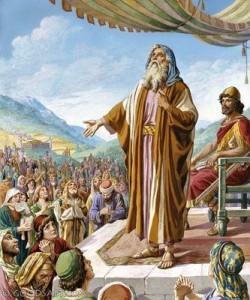 Samuel faithfully discharges his responsibilities as prophet, priest, and judge. He invites the Israelites to reaffirm their choice of King Saul and sets the record straight. Saul was their choice for a king. However, their covenant-keeping God is their Rightful King. He is the One who delivered them from their bondage in Egypt and in every instance acted rightly. He proved Himself faithful to His promises. He brought them into the land. He appeals to the Israelites to repent of their sin and serve the Lord.
Samuel faithfully discharges his responsibilities as prophet, priest, and judge. He invites the Israelites to reaffirm their choice of King Saul and sets the record straight. Saul was their choice for a king. However, their covenant-keeping God is their Rightful King. He is the One who delivered them from their bondage in Egypt and in every instance acted rightly. He proved Himself faithful to His promises. He brought them into the land. He appeals to the Israelites to repent of their sin and serve the Lord.
Samuel also asks the Israelites to give witness to the fact that, although his sons were greedy and dishonest in their service, he himself has consistently acted rightly as a leader, without evidence of partiality, selfishness, corruption, or any attempt to manipulate or oppress anyone (12:1-5).
In contrast to this, he reminds the people of their history of forgetting the Lord and falling into the sin of idolatry. He rebukes his people for their disobedience and reminds them that because of their disobedience, God allowed them to suffer defeat at the hands of their enemies in the past.
Samuel recounts the history of the period of the Judges and the cycles of spiritual declension and deliverance. He includes himself in the list of judges whom God raised up to restore them to seasons of relative peacefulness, even as they dwelled amid their enemies (12:9-11).
He reminds them that, although they have refused to have the Lord as their king and chose Saul instead, God never abdicates His throne and rules over all. Their accountability to God abides. (12:15).
Samuel prophetically proves their accountability for rejecting the Lord as their King by calling upon the Lord. In response, the Lord sends thunder and a rainstorm that threatens to destroy their wheat harvest.
This action causes the people to admit their sin:
1 Samuel 12:19 19 Then all the people said to Samuel, “Pray for your servants to the LORD your God, so that we may not die, for we have added to all our sins this evil by asking for ourselves a king.”
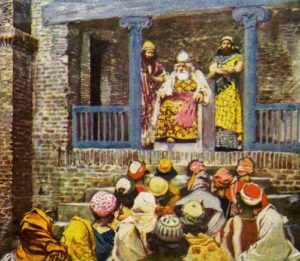 Samuel fulfills his role as prophet, consistently reminding the people of the Lord’s covenant promises and mercies:
Samuel fulfills his role as prophet, consistently reminding the people of the Lord’s covenant promises and mercies:
1 Samuel 12:22 22 “For the LORD will not abandon His people on account of His great name, because the LORD has been pleased to make you a people for Himself.
Samuel fulfills his role as priest:
1 Samuel 12:23 23 “Moreover, as for me, far be it from me that I should sin against the LORD by ceasing to pray for you; but I will instruct you in the good and right way.
What about us? Are we faithful in our roles as believer-priests? Do we faithfully communicate God’s truth, His message of reconciliation? Do we speak the truth in love?
Do we pray for those the Lord has brought into our lives? Do we instruct them in the good and right way?
Samuel did not say, “far be it from me that I should sin against you by ceasing to pray for you.” He said, “far be it from me that I should sin against THE LORD by ceasing to pray for you.”
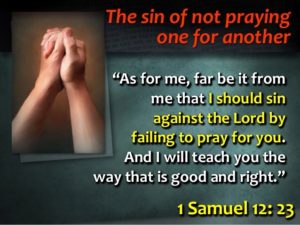 This highlights an important fact about prayer. Prayerlessness is a sin against the Lord. When we pray, we open the door for God to act. It is not that God cannot act without our prayer. He has sovereignly decreed to limit Himself in some matters to what we pray for.
This highlights an important fact about prayer. Prayerlessness is a sin against the Lord. When we pray, we open the door for God to act. It is not that God cannot act without our prayer. He has sovereignly decreed to limit Himself in some matters to what we pray for.
G. Campbell Morgan puts it this way: “No prayer of mine can change the will of God, which is ever ‘good and acceptable and perfect’ (Romans 12:2). But my prayer can and does make it possible for His power to operate in ways impossible without it. When I cease to pray for others, I sin against God first, because I hinder Him in that I do not help Him. Therefore, I grievously sin against men when I cease to pray for them.”
Verse 24 is a good reminder for all of us:
1 Samuel 12:24 24 “Only fear the LORD and serve Him in truth with all your heart; for consider what great things He has done for you.
Samuel prophetically warns that their king will be swept away (1 Sam 12:25).
Although King Saul starts out as a hero, delivering his compatriots at Jabesh Gilead, he soon raises the ire of the Philistines when his son Jonathan attacks the Philistine outpost at Geba.
The Philistines gather an immense army that puts terror into the hearts of the Israelites. Saul realizes they are in a desperate situation and need the favor of the Lord. He presumptuously violates God’s law and acts as a priest. He takes it upon himself to offer a burnt offering because Samuel, the appointed priest, is delayed in showing up at the appointed time in Gilgal.
When Samuel arrives, he reprimands Saul and pronounces that none of his descendants will ever come to the throne. This is the first hint we have of the future reign of King David, “a man after God’s own heart.” Saul is reminded of the importance of reigning in the fear of the Lord. If he had kept the commands of the Lord, his kingdom would have been forever established in Israel.
1 Samuel 13:14 14 “But now your kingdom shall not endure. The LORD has sought out for Himself a man after His own heart, and the LORD has appointed him as ruler over His people, because you have not kept what the LORD commanded you.”
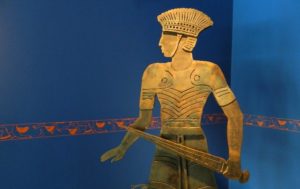 Samuel leaves Gilgal and Saul gathers his small army of 600. The Philistines have a military advantage not just in their vast number, but because they had exclusive access to the technology of manufacturing iron weapons and they priced them so highly that the Israelites could not afford them.
Samuel leaves Gilgal and Saul gathers his small army of 600. The Philistines have a military advantage not just in their vast number, but because they had exclusive access to the technology of manufacturing iron weapons and they priced them so highly that the Israelites could not afford them.
1 Samuel 13:22 22 So it came about on the day of battle that neither sword nor spear was found in the hands of any of the people who were with Saul and Jonathan, but they were found with Saul and his son Jonathan.
We are not at a disadvantage when we battle our enemy with the spiritual weapons God has graciously provided. Without them, however, we would be defeated.
NEW TESTAMENT READING: John 7:1-29
Although they do not yet believe that Jesus is the Messiah (John 7:5), the half-brothers of Jesus want him to be successful in his career as a religious leader. They advise him to go to Jerusalem for the Feast of Tabernacles so he can build up his reputation as a miracle worker and please his fan base. They saw the event as being a great public relations opportunity. They were not aware that the religious leaders in Jerusalem in Judea were already planning how to arrange for Jesus to be killed.
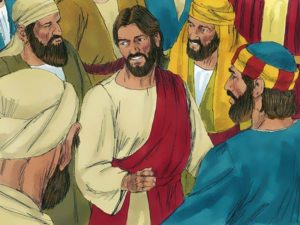 Jesus tells his brothers that he is not living to please his fans. He dramatically contrasts His’ modus operandi’ from that of his brothers and the popular culture:
Jesus tells his brothers that he is not living to please his fans. He dramatically contrasts His’ modus operandi’ from that of his brothers and the popular culture:
John 7:6-7 6 So Jesus said to them, “My time is not yet here, but your time is always opportune. 7 The world cannot hate you, but it hates Me because I testify of it, that its deeds are evil.”
Do we have that kind of clarity? Do we realize that we are ‘under orders’? Are we willing to wait on God’s timing? Do we recognize and testify the truth about the fallen world’s condition?
Jesus eventually goes up to the Feast but not with the agenda of his brothers or according to their preferred schedule. He does not live by the wisdom of fallen men, even when they mean well. He does not go to the Feast with great fanfare but in secret.
Halfway through the Feast, Jesus begins to teach. Once again, He speaks with authority. He is the author of the Law and claims to be God’s spokesman. He is the Lord of the Feasts because He authored them and knows what they commemorate. He also exposes the fact that the religious leaders are being deceptive and trying to kill him (7:19).
His opponents charge him with being demon-possessed.
Jesus exposes the hypocrisy of the Pharisees who have rebuked Him for making people whole (healing) on the Sabbath when they themselves permit circumcision when the 8th day falls on the Sabbath. Jesus affirms that in both cases, the Law is not broken.
Jesus exposes the ignorance of the religious leaders who do not concede that He is the heaven-sent Messiah, even though they have the clear evidence exhibited before them.
TODAY’S READING FROM THE PSALMS
PSALM 108
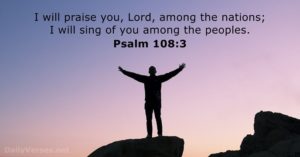 Are you ready to praise the Lord? (v.1-5)
Are you ready to praise the Lord? (v.1-5)
The heart that is steadfastly looking to Christ is a heart that will sing!
There is no limit to the extent of God’s faithfulness. It reaches beyond the heavens.
The Lord reigns supreme, towering over all enemies.
Are you ready to make your requests known to God in prayer? (v.6-13)
God has given us sacred promises for deliverance. Let us call upon Him for His promised help.
The Psalm ends with a call for God to bring about salvation (v.6-13).
Psalm 108:12-13 12 Oh give us help against the adversary, for deliverance by man is in vain. 13 Through God we will do valiantly, and it is He who shall tread down our adversaries.
TODAY’S READING FROM THE BOOK OF PROVERBS
 Proverbs 15:4 4 A soothing tongue is a tree of life, but perversion in it crushes the spirit.
Proverbs 15:4 4 A soothing tongue is a tree of life, but perversion in it crushes the spirit.
Gentle words can be life-giving and healing. But words that distort the truth, ignoring the truth of God’s provisions and promises, cause discouragement.
PRAY FOR THE NATIONS- EGYPT
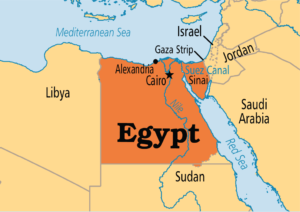 (from “Operation World” p. 314- 317)
(from “Operation World” p. 314- 317)
Egypt
Arab Republic of Egypt
Africa
Geography
Area: 997,739 sq. km
Mostly desert; only 3% is arable land – along the banks and delta of the Nile River and around the Western Desert oases.
Population: 84,474,427 Annual Growth: 1.83%
Capital: Cairo
Urbanites: 42.8%
HDI Rank: 123 of 182 (UN Human Development Reports 2009)
Peoples
Peoples: 39 (59% unreached) All peoples
Unreached Peoples Prayer Card
Official language: Arabic Languages: 27 All languages
Religion
Largest Religion: Muslim
| Religion | Pop % | Ann Gr | |
| Christians | 10,838,069 | 12.83 | 1.4 |
| Evangelicals | 3,282,646 | 3.9 | 4.6 |
| Muslim | 73,213,986 | 86.67 |
FROM PRAYERCAST.COM
The Arab Spring (a series of anti-government protests and uprisings across the Middle East starting in 2011) sparked political upheaval across the Arab world. Egypt was no exception, erupting in mass protests that led to the ousting of then-President Hosni Mubarak. Clashes between the Muslim Brotherhood protesters and the brutally reactive military left hundreds dead. Conflict continues to polarize the nation. Amid an increasingly repressive government, Egypt is terrorized by Islamic extremism. Following the overthrow of President Mohamed Morsi in 2013, militants linked to the Islamic State (IS) led an insurgency, bringing widespread terror and the tragic deaths of thousands. Political unrest has inhibited the nation from addressing economic problems, corruption, and strained resources. Approximately a quarter of the population lives in poverty, only exacerbated by the water crisis. Farmers face imprisonment or hunger due to the regulations on crops that require more water. In addition to this tragedy, forced labor and sex trafficking leaves street children especially vulnerable.
Egypt was a majority-Christian nation for over 1,000 years, and today it remains home to the Middle East’s largest body of Christians – the Coptic Church (12%). Evangelical Christianity is on the rise, though still only about 3% of the population. Yet Islam remains the state religion and the faith of 87% of its people. Egypt is also often seen as the intellectual center for Sunni Islam. Though the Egyptian Church has endured persecution for over 2,000 years, recent instability and the presence of the Islamic State have intensified their suffering. Horrific scenes of church bombings have brought the plight of Egyptian Christians to the world stage. However, even as persecution increases, so does the number of Muslims turning to Christ! Scripture is more accessible than ever, and the Church is growing in unity across theological difference
Answer to Prayer
The innovative use of electronic media through websites, chat rooms, satellite TV, and mobile phone downloads has opened a way for millions of Muslims to hear the gospel clearly, in safer environments for true seekers. Signs indicate a very widespread response.
Challenge for Prayer
The Coptic Church is by far the largest body of Christians in the Middle East and is a strategic key for the evangelization of the region. Pray for:
a) Church leaders, especially the Coptic Pope. Wisdom, grace, and confidence are needed in handling the Muslim authorities, Islamist persecution, and the questioning world. A close walk with God is essential to be both a bridge between communities and an example to their flock.
b) A spiritual awakening Church-wide in the midst of mounting pressures and communal tensions. Many Copts are very nominal. The responses to Muslim agitation need to be humble and loving but strong, and only those walking in faith are capable of this.
c) The biblically-based renewal movement in the Coptic Church, which has steadily gained momentum since 1930. It strongly emphasizes Bible study and personal faith, and many are fervent witnesses for the Lord. Monasticism sees a rejuvenation as well. Pray for the growth and effectiveness of this movement of the Spirit.
d) Christians are numerous in business, the professions, and health services, but overall the Coptic influence within Egypt is much less than their large numbers warrant. Pray that Copts might have a positive and transforming effect in the nation, just as Joseph did millennia ago.
PRAYER: Lord, may we never forget that You are our Rightful King. May we not bow before the idols manufactured by our deceitful desires. May we accept no substitutes for Your righteous rule: political, ideological, religious, social, or personal, whether intellectual or emotional. We thank You for the example of Your Son, whose obedience was not swayed by even those nearest and dearest to Him. Give us the conviction to remain true to Your Word and give us the boldness to proclaim it. Give us ready hearts to praise You and to intercede for the deliverance of those who are held captive by sin and the forces of darkness. In Jesus’ Name. Amen.
PASTOR DAVID
